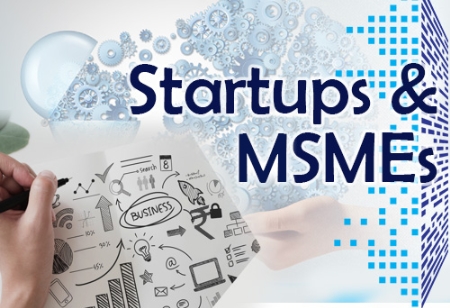
Union Budget 2021 to Reshape & Boost MSMEs and Startup Ecosystem


The year 2020 was an uncertain year that was full of challenges for livelihoods and the overall economy of the country, which was the result of the sudden occurrence of the COVID-19 pandemic. The crisis has a multi-sector impact, and according to the International Labour Organization, has already transformed into an economic and labour market shock, impacting not only supply (production of goods and services) but also demand (consumption and investment). With the COVID-19 pandemic impacting their cash cycles, MSMEs and the Indian startup ecosystem that are the base of India’s inclusive growth story felt a significant impact and faced severe disruptions. As an important part of the domestic and global value chains, the plight of the startups and MSMEs are of deep concern. However, the budget 2021 brought huge expectations, regarding the boost of the domestic manufacturing across sectors, in line with the Indian government’s focus for a self-reliant economy. So, let’s have a look at how Budget 2021 can reshape the MSMEs and startup ecosystem of India.
During the Budget 2021 announcement on 1st February 2021, Finance Minister Nirmala Sitharaman proposed a slew of measures to help startups and MSMEs grow, including the incorporation of one Person Company without any restriction on paid-up limit. “This move will allow such firms to grow without restriction on paid-up capital and turnover, allowing conversion into any other type of company at any time, reducing residency limit for an Indian citizen to set up an OPC from 182 days to 120 days, and allow also non-resident Indians to incorporate OPCs in India,” FM Sitharaman said in her budget speech. She also mentioned that the government will increase FDI from 49 percent to 74 percent in insurance budget. India’s complex tax and financial regulatory regime are major reasons for our low rankings across ‘Ease of doing business’ indices globally. However, the present regime has consistently stressed its focus on making regulations simpler and our jurisdiction predictable for doing business. With COVID-19 taking its toll on most MSMEs, the scene with most startups and e-Commerce companies is cautiously optimistic. Some of the larger startups have reported fundraising at record valuations while established e-Commerce companies have made the most of the ‘new normal’. Though, this year budget has something for every industry/sector. However, the major focus of the budget was Aatmanirbhar Bharat and how to infuse new life into the crumbling economy that is slowly standing up.
Looking at the budget 2021 reformations several reactions from across the industries started pouring in. Speaking about MSMEs, George Alexander Muthoot, MD, Muthoot Finance stated “Reflective of the importance of the MSME sector, the government has provided Rs. 15,700 cr for it, double of last year’s budgeted estimate and we stand steadfast with the MSMEs, individuals and entrepreneurs of India in financing and enabling their Atmanirbhar Bharat ambitions”.
“Collateral free loans and fund of funds for MSMEs will stimulate growth and provide solace to MSMEs hit by the pandemic” stated Seema Prem, CEO & Co-Founder, FIA Global.
Praising the decisions of the government, Deepak MV, Co-founder & CEO, Etrio said “This budget definitely demonstrates the commitment by the government to boost demand and generate employment through investments in areas like infrastructure, finance, and healthcare. Also, the budget extends support to start-ups and MSMEs through tax exemptions and increase coverage of small companies threshold and, higher allocation towards MSME sector”.
Talking about the reformation regarding the ecosystem of Indian startups, FM Sitharaman stated that the government has extended the tax holiday for startups by one more year, providing a much-needed post-pandemic boost to the upstarts. According to Union Budget 2021-22, startups will get capital gains exemption by one more year to 31 March 2022. Not just that but startups also have one more year to claim tax holiday. Let’s have a look what renowned leaders from various industries said about the reformation.
“The budget this year has given a significant support to the startup ecosystem that will help turbocharge their growth. The concept of OPCs with an option to convert into any other type of the company at any time, reducing residency limit for an Indian citizen to set up an OPC from 182 days to 120 days, and allow also non-resident Indians to incorporate OPCs in India will certainly boost innovation,” stated Seema Prem, CEO & Co-Founder, FIA Global.
Ajai Chowdhary, Founder HCL, Board member IAN & IC member IAN Fund said that the budget will bring a huge boost for startups, and this will empower Atmanirbhar India. He stated “Budget focus to move India into global supply chain: welcome move towards Atmanirbhar India. Big boost for startups with reconfiguring of OPCs, redefinition of small businesses: brings ease of business under Atmanirbhar Bharat. The budget allocated for the agricultural sector will lead to infrastructural development and create opportunities for startups in the sector leading towards self-reliant India vision”.
Yogita Tulsiani, Director & Co-Founder, iXceed Solutions stated “The year 2020 has seen a lot of ups and downs. The budget for 2021 has included various ways to bring the scattered businesses back on track. The Union Budget 2021 has focused on skill development by tieing up with countries like Japan and UAE. This would help in the overall development of the Human Resource sector. With everything going digital, the launch of an online platform for gig workers will definitely ease the process of work. Startup sector is gifted with the Tax Holiday with the extension in eligibility for one more year till 2021. The tax exemption on capital gains till March 2022 will push more investments”.
Whatever the expectations are, let’s hope for the best for the MSMEs and Startup ecosystem of India. After all, a resilient MSME sector and a developing and dense startup ecosystem will automatically translate into a sound economic future for the nation.